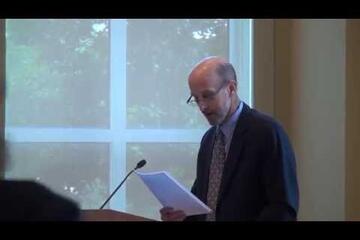The Johns Hopkins Berman Institute of Bioethics has marked a milestone in its history, and in the field of bioethics, with a ceremony installing Ruth R. Faden as the inaugural Andreas C. Dracopoulos Director of the Berman Institute.
Johns Hopkins University President Ronald J. Daniels spoke at the event, acknowledging the groundbreaking achievement of an endowed directorship for a bioethics institute, the first such position in the world for the young, interdisciplinary field of scholarship.
Faden, the Philip Franklin Wagley Professor of Biomedical Ethics, is the founding director of the Berman Institute, which was established in 1995. The philanthropic gift from Andreas C. Dracopoulos endowing the directorship ensures funding for the position through Faden's tenure and beyond. The gift is only the latest instance of long history of support by Dracopoulos, who serves as an active member of the Berman Institute Advisory Board and a trustee of Johns Hopkins University.
"Dr. Faden has spent her entire career passionately committed to dealing with ethical challenges in the biomedical science field and in women's health," Dracopoulos said, adding that the directorship gift is "nothing more than a simple acknowledgment of how far Ruth has taken the institute and how promising its future is both within the Hopkins family and within society at large."
In her remarks, Faden recalled her early years at Hopkins, when the idea of a bioethics institute with an endowed directorship "was not even a gleam in the eye." Faden put the directorship in context, from those early days of grassroots, informal faculty lunch gatherings to the bright future she sees for the Berman Institute.
"Andreas' remarkable gift will allow us to establish new big dreams and new big hopes for the next chapter in the Berman Institute's history," she said. "I am convinced that, more than ever, ethics is absolutely central to many of the great challenges facing humanity, now and in the future. These challenges do not fall neatly in one bin of the academy or the other, and so frequently these challenges are completely interdependent. Health, water, food, energy—it will be impossible to solve one in isolation from the other."








